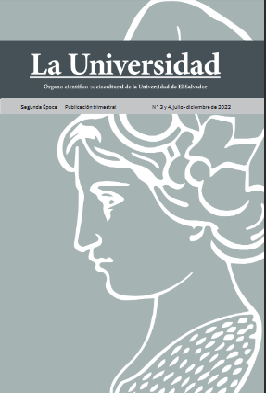Perception and Research Experience of the Teachers to the Medical Faculty of The Salvador University
Keywords:
Research training, Postgraduate studies, Thesis adviceAbstract
The study proposed to characterize the teaching population of the Medical Faculty with respect to its investigating experience itself and to his perception of the service of formation that they offer in investigation. Through an instrument type questionnaire, the envoy went to the institutional mail’s address to teachers’ total population than labor in the Medical Faculty, in application Google: Fill-out forms. They accepted answers during the month of March 2021. 165 questionnaires of 315 teachers’ total with deals of Ley of salaries were responded and Permanents, where obtained him the fact that the expert with over 5 years in teaching, with not much investigating experience and with a fall is a teaching population principally values of postgrad’s studies. The teachers by majority perceive the investigating competition like a subject unnecessary curricular; Nevertheless, they exercise the investigating formation in the main and, teachers’ reduced number they are assigned to the expert advice of the works of grade or they are renowned like appraising tribunal for Thesis’s student defenses. The teachers in general perceive problems of quality in the level of scientific rigor of the theses of the undergraduates, however, they do not brave the problem like own.
Downloads
References
Ávila, E. F., Pérez, J. C. & González, F. C. (2019). Construcción social de las competencias investigativas de los docentes de educación superior. REFCalE, 7 (2), 91-110. http://refcale.uleam. edu.ec/index.php/refcale/article/view/3006
Ayala, E. T. & Barrera, J. M. (2018). Competencias investigativas en docentes universitarios. El caso del departamento de arquitectura de la Universidad Francisco de Paula Santander. Revista Perspectivas, 3 (1), 71-84. DOI: https://doi. org/10.22463/25909215.1425
Baldo, J. & Rangel, Z. (2015). Medición de las competencias investigativas en los docentes adscritos al departamento de ciencias sociales de la Universidad Nacional Experimental del Táchira. Aibi Revista de Investigación, Administración e Ingeniería, 3 (2), 27-36. DOI: https://doi.org/10.15649/2346030X.513
Barbón, O. G., Barriga, S. F., Cazorla, A. L. & Cepeda, L. G. (2018). Influencia de la Antigüedad y del total de Horas de Investigación en la Producción Científica de Docentes Universitarios. Revista Formación Universitaria, 11 (4), 75-82. DOI: https://doi.org/10.4067/S0718-50062018000400075
Becerra, G. M. (2012). La formación investigativa: Su pertinencia en pregrado. Revista Virtual Universidad Católica del Norte, 1 (35), 367-79. https://revistavirtual.ucn.edu.co/index.php/RevistaUCN/ article/view/366
Freire, E. E., Ríos, A. R., & Cuenca, N. P. (2016). Formación de competencias investigativas en los estudiantes universitarios. Revista Atenas, 1 (33), 18-31. http://atenas.umcc.cu/index.php/ atenas/article/view/183
Levison, Y. C. & Salguero, L. A. (2009). Una propuesta de competencias investigativas para los docentes universitario. Laurus Revista de Educación, 15 (30), 118-37. http://www. redalyc.org/articulo.oa?id=76120651006
Quiroz, R., Chávarry, P. & León, F. (2014). Baja producción científica estudiantil y de docentes universitarios de investigación científica: Un problema persistente. Revista del Cuerpo Médico del HNAAA, 7 (4), 58.
Reyes, L. M. V. (1995). Una experiencia de participación estudiantil en investigación. CIENCIA ergo-sum, 2 (1), 27-31. https:// cienciaergosum.uaemex.mx/article/view/8068
Rodríguez, D. M. & Delgado, D. L. (2014). Las habilidades investigativas como eje transversal de la formación para la investigación. Revista Tendencias pedagógicas, 24, 347-60. https:// revistas.uam.es/tendenciaspedagogicas/article/view/2110
Rodríguez Y. J. (2009). La formación de docentes investigadores: Lineamientos pedagógicos para su inserción en los currículos. Teoría y praxis investigativa, 4 (1), 25-32. https://hdl.handle. net/10901/10009
Rojas, C. & Aguirre, S. (2015). La formación investigativa en la educación superior en América latina y el Caribe: Una aproximación a su estado del arte. Eleuthera, 12, 197-222. DOI: https:// doi.org/10.17151/eleu.2015.12.11
Román, C., Hernández, Y., Campoverde, D., Baculima, J. & Tamayo, T. (2017). Habilidades científico investigativas de docentes de la Universidad Católica de Cuenca, Ecuador. Panorama Cuba y salud, 12 (1), 32-9.
Salazar, S., Lugones, Á. C. & Acuña, J. E. (2020). Formación científico investigativa en estudiantes universitarios del perfil ingeniería mecánica en Venezuela. Didasc@lia: Didáctica y Educación, 11 (5), 187-99. http://revistas.ult.edu.cu/index.php/ didascalia/issue/view/57
Vinces, M. R., De la Peña, G. & Obando, L. M. (2019). La formación investigativa de los estudiantes de la carrera de optometría de la facultad de ciencias de la salud, Universidad Técnica de Manabí. Polo del Conocimiento, 4 (5), 157-75. DOI: https:// doi.org/10.23857/pc.v4i5.970
Zúñiga, W. (2015). Una perspectiva acerca de la investigación y la docencia universitaria en Colombia. En Clave Social, 4 (1), 10-23. https://www.researchgate.net./publication/349147265
Downloads
Published
How to Cite
Issue
Section
License

This work is licensed under a Creative Commons Attribution-NonCommercial 4.0 International License.
Los textos académicos y científicos que se publican en la Revista La Universidad están protegidos bajo la licencia CC BY NC SA 4.0, esta permite usar una obra para crear otra obra o contenido, modificando o no la obra original, siempre que se cite al autor, la obra resultante se comparta bajo el mismo tipo de licencia y no tenga fines comerciales (https://creativecommons.org/licenses/by-nc-sa/4.0/deed.es) . El autor es el único que pose los derechos de publicación y la Revista La Universidad posee los derechos de difusión.






